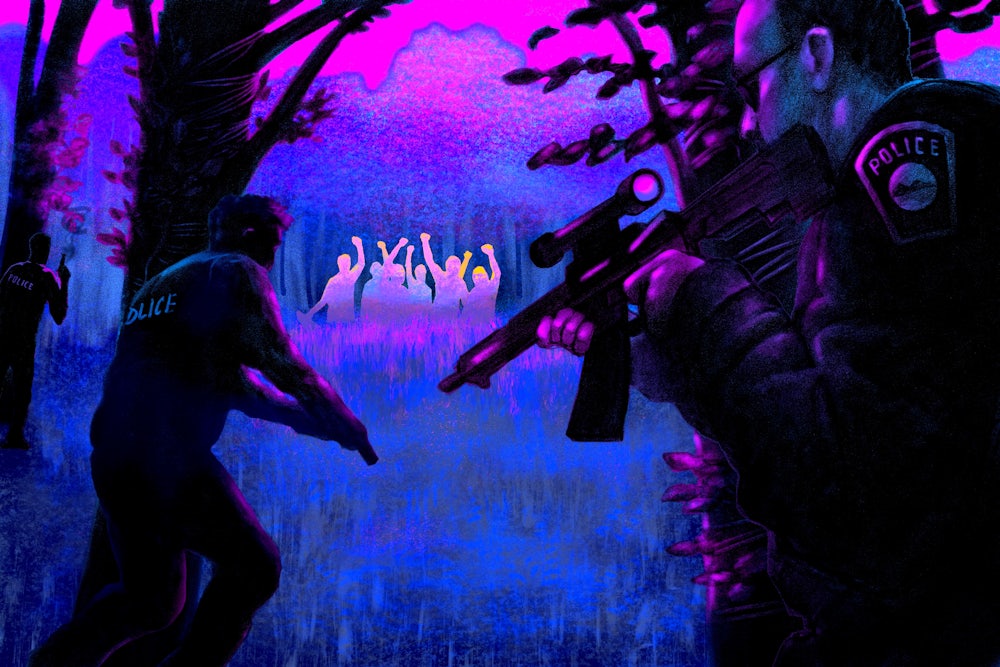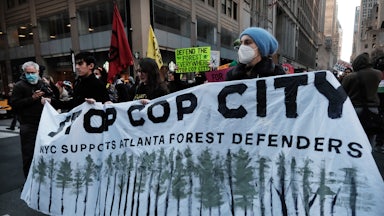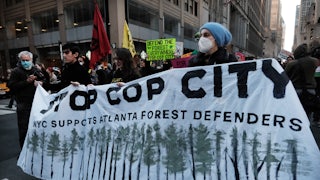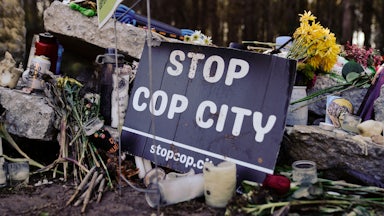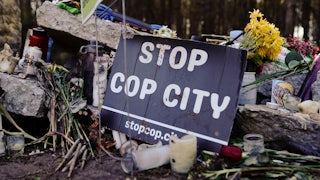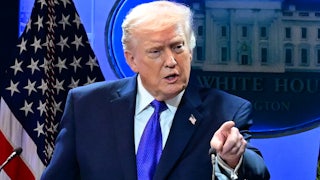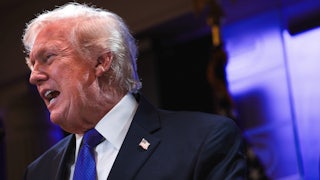Since its approval by the Atlanta City Council in 2021, the Atlanta Public Safety Training Center—more commonly referred to as Cop City—has been a flashpoint of controversy. The $90 million facility is set to be built within a large forest adjacent to predominantly Black and poor neighborhoods; in protest, activists have taken up residence in the forest to try to stop its construction. In January, conflict between police and protesters turned deadly. On episode 72 of The Politics of Everything, co-hosts Laura Marsh and Alex Pareene talk to New Republic senior contributing editor Molly Taft about the Cop City protest as an environmental justice movement and New York magazine senior writer Sarah Jones about the novel applications of law used to charge protesters with serious crimes.
[clip]: Cop City will never be built, that’s it, hey hey! Cop City will never be built! Cop City will never be built!
Alex Pareene: Cop
City is the name protesters have given to a planned complex of
police and fire training facilities in Atlanta. The plans for the center are
vast: It will sit on 85 acres within a 1,000-acre forest.
Laura Marsh: It will have classrooms and a shooting range and a place to practice high speed chases. But it will also have elements of an actual town. A mock streetscape with hotels and convenience stores and apartments, where police will act out “real world crisis situations.” It will also have a barn and pasture for police horses.
Alex: The Atlanta City Council approved a lease agreement for construction of the center, officially named the Atlanta Public Safety Training Center in 2021, despite considerable public testimony against the plans.
Laura: The fight against Cop City combines environmental and social justice activism. And the protesters have been met with a severe crackdown.
Alex: In January, as tensions escalated at the site, a protester was shot dead and a state trooper was wounded. By March this year, prosecutors had charged 23 people with domestic terrorism. And in September, they indicted 61 protesters on RICO charges.
Laura: Today on the show, we’re talking about this plan for a mock city in the woods, what it shows about climate activism and social justice and at the same time, the suppression of protest. I’m Laura Marsh.
Alex: And I’m Alex Pareene.
Laura: This is The Politics Of Everything.
Alex: Cop City is to be built on land the city owns in the Weelaunee Forest, also referred to as the South River Forest, which is seen by many as a critical part of Atlanta’s environmental infrastructure. The fight against Cop City has garnered national attention, both from climate activists and social justice activists who argue that the center’s location also adversely affects nearby poor and predominantly Black neighborhoods.
TNR contributing senior editor Molly Taft joins us to give some more context to the Cop City battle, both within the civic history of Atlanta and the climate justice movement more generally. Molly, welcome to the show.
Molly Taft: Hi. Thank you for having me.
Alex: Tell us very broadly, what is the Atlanta Public Safety Training Center, what is it for, and why does Atlanta think they need it?
Molly: So, the city of Atlanta wants to build a big police training facility in a green space known as Weelaunee Forest. The facility is going to cost around $90 million. It’s going to be huge. Among the training features, there’s going to be a fake town to ostensibly train police officers in actions. It’s just a big cop playground, basically. I’m sure that’s not how they would describe it.
So, they announced this facility in 2021, and the city at the time said that they needed this because of recent rises in homicide rates. There’s a lot of back and forth about those statistics, but that’s what the city said it needed it for and there’s two big issues here. One is that obviously, Atlanta, like most of the rest of the U.S., went through a big reckoning in 2020, with the George Floyd protests and the Black Lives Matter movement. Locally, about three months after George Floyd was killed, there was another killing of a citizen, Rayshard Brooks, by a cop in Atlanta. So, Atlanta has had its own reckoning with police presence, in obviously a historically Black city.
And the other issue here is the location. The Weelaunee Forest has a long history: It was in the early 1800s, the site of the Muscogee Creek people, a tribe that lived there before they were pushed out. Most recently, for much of the twentieth century, it was actually a prison farm. Some experts have recommended that it be added to the National Register of Historic Places and actually, Stokely Carmichael was briefly held there during the civil rights period.
So it’s got a lot of history and it’s a big green space, and a lot of the green spaces in the city are in white neighborhoods, and this one happens to be in a neighborhood that’s primarily Black.
The building of a cop training facility of this size and stature in a space that is for a Black community in a city that doesn’t have a lot of green spaces is obviously—there’s a lot of layers. There’s a lot of issues with that.
Alex: It encompasses so many different things, doesn’t it? I’m sure it’s true in Atlanta, because it’s true in almost every American city. You can look at a map of most major American cities and trees alone can tell you a lot about who lives where in an American city.
I guess one of the interesting things about this facility, obviously, we said the City Council approved it, it’s not just being built with public money. It’s a sort of quasi privately funded thing, isn’t it?
Molly: Yes, I’m very glad you pointed that out. Originally, the plan was a third public money, so the city would pay for it, but a bunch of funds are coming from the Atlanta Police Foundation. And this is one of those pro-police nonprofits that have cropped up in a bunch of cities.
This particular nonprofit has gotten a lot of money and support from some pretty high-profile organizations. So past donors have included Bank of America, Chick-fil-A, Coca-Cola. On their current board, there’s representatives from Home Depot, AT&T, Delta Airlines, and one really notable contributor to the foundation is the Cox Foundation, which is the charitable arm of Cox Enterprises, the media conglomerate that also owns the Atlanta-Journal Constitution, which is the major paper in the area.
Alex: Right.
Molly: Yeah, and the AJC has been criticized for its coverage of the planned training center as well as the protests in response to it. So there’s a pretty clear tangle of interest going on here.
Alex: Yeah, these private police foundations are pretty wild when you actually dig into them. It seems a little improper for these huge sums of corporate money to be going directly to and in this really unaccountable, undemocratic way, to just be going into the hands of the police.
Molly: It’s a good way to pay a lot of money to police forces and have it be significantly less accountable than public funds
Alex: Exactly.
Laura: I want to go back to the forest itself for a minute. What are the criticisms from the community of the changes that Cop City will bring?
Molly: I think that what’s important to keep in mind about green spaces is they’re not just pleasant places for recreation, although, of course, they are. Green spaces in cities are also really important climate-wise, like Alex mentioned. Trees are carbon sinks so they can help bring down emissions more generally, but also, areas in cities without trees or other green spaces have been found to be significantly hotter during the summer.
It’s called the urban heat island effect. It gets hotter when there’s more concrete, more steel, more development around. And so at its very base, taking away green spaces, which is often what happens in lower-income communities and communities where people of color live, that’s a direct consequence for them as the cities get hotter. And Atlanta’s hot already and it’s very humid. I think it’s important to note that not all of the forest is going to be earmarked for this project.
It’s a relatively smallish percentage, but still, the fact that they decided to—I think in some people’s eyes—take away what could be a more valuable resource to a community that doesn’t have these spaces there, is really what a lot of the issue is with folks who live there and folks who are opposed to this project.
Alex: It’s almost like it’s not even just taking away the existing forest but removing other potential uses of it.
Molly: And then also there’s the symbolism of having what many people would probably consider a weapon of the state on the site of a former prison that incarcerated a lot of people of color.
Alex: Speaking of the symbolism of it, I think it’s really important to remember that it’s going to contain, basically, this mock village, right? As if to make really obvious the subtext of what these police are training for, it seems to me anyway, which is really making plain what the powers that be think of the role of the police in a community like Atlanta.
Molly: Yeah, and I just did confirm there have been some activist reports on the ground that parking lots and trailheads have been dug up as part of this construction process and a land swap that the city also did with another private company that is enabling them to build this facility. So, there are actually resources being taken away from the community in this green space.
Laura: After the City Council approved the plan, environmental activists moved to prevent Cop City from being built. There was confrontation, some of them violent. One ended with the shooting of an officer but also with the death of a protestor named Tortuguita. Can you tell us about what they did and how the city responded?
Molly: So in 2021, the City Council approved these plans despite pretty widespread community protest, and that initiated some activists setting up camp inside the site itself. So, they built an encampment in the forest, on the site, to attempt to basically prevent construction from happening, and they call themselves forest defenders.
Laura: Which is actually a pretty tried and true tactic for environmental protestors.
Molly: Yeah, it’s a tactic that’s not unusual. What is unusual is the scale of the police response.
So, there were arrests all throughout 2022. [Police] kept coming into the site and disturbing the encampment. In January of this year, there was a police raid that ended in the death of Manuel Terán, who was known to friends and fellow protesters as Tortuguita. So, what happened after this raid in January is the initial police report came out claiming that they were shooting at an officer. But activists and protesters in the area immediately began pushing back on this narrative and basically said that Tortuguita was unarmed and was sitting in a defensive position when they were killed. This led to widespread unrest throughout the city.
The governor called in the National Guard. And I think this is what has worked well for the powers that be in Atlanta, is the response has been very slow. So national media attention kind of waivers. There was a lot of attention on the initial death, but their official autopsy results were not released until April and the autopsy results—and these were the official ones from the city—showed that [Tortuguita] had 57 gunshot wounds and no gunpowder residue. A private autopsy done by their family showed that they died in a defensive position.
The Guardian reported that this is the first killing of an environmental defender in the United States, which is pretty notable.
Alex: The first state killing or police one.
Molly: Yeah, the first death of someone defending an environmental project in the United States. It’s actually just remarkable when you consider just how little it filtered up through the national media. I think that speaks to how the cop city story is being told on a national level.
Laura: Do you think part of that is the gappy local media coverage?
Molly: Well, I want to be clear, there are some really great local outlets doing reporting on the ground that have been on the story since day one. But I also just think that the national media, first of all, they don’t know how or they don’t have time to interrogate local stories where there’s a significant cop narrative that needs to be investigated.
And secondly, the folks who are living in the forest and defending it, their asks encompass so many things: They encompass asks about police brutality, they encompass asks about community, they encompass environmental asks. And it gets complicated, and it gets messy, and people don’t have the time or inclination to really dig into what’s actually going on when it’s a complex narrative like this.
Laura: You mentioned the governor calling in the National Guard. I just want to break down the response. So, it was local law enforcement initially coming to the camp and then how was the response stepped up?
Molly: So, the raid was on January 18. That’s when Tortuguita— they were fatally shot. There were protests in downtown Atlanta a couple days later on the 21st, and the governor declared a state of emergency on the 26th. And then the bodycam footage wasn’t released until February 8, so it was several days later, and after all of these protests had happened and people had been arrested, and then the autopsy results were released. So again, it was just a serious drawing out of what was going on.
Laura: And so even though it seems like the death of this protester points to excessive use of force, they stepped up the response instead of pulling back. In the months since then, has there been any change?
Molly: I think if anything, they are getting more aggressive. If you just look at the actions taken since Tortuguita’s death, January to now, so in March, 35 people were arrested at the training center site, and some of them were charged with felony charges. Then in May, and this one’s really mind-blowing, police raided the homes of nonprofit executives whose organizations are connected to resistance efforts and then they charged three nonprofit folks with charity fraud—basically, some really serious charges for essentially, helping to financially support some of these resistance efforts.
Laura: You cover a range of environmental and climate issues. How would you say this response compares with other big protests that we’ve seen in the last few years?
Molly: I think it is remarkable in the violence that is being shown to protesters, but I also think it’s important to situate it as part of a larger trend. So back in 2016, the Dakota Access Pipeline protests got national attention like we hadn’t seen before. And in the wake of that, right-wing interests basically made it their job to make environmental protest as criminal as possible and they’re just very good at this. The American Legislative Exchange Council, ALEC, which is affiliated with the Koch brothers, basically shopped around versions of a bill that would criminalize pipeline protest. At this point, 17 Republican-controlled states have now passed something like this, and so protesters can face prison and fines, for stuff like protesting pipelines or construction sites. A lot of the ways they do this is by marking these sites as critical infrastructure—so something that should be protected by the state, even though they are essentially private projects.
And we saw a little bit of this in Minnesota. There was a protest against a pipeline owned by the company Enbridge, and like Dakota Access, this was a Native-led protest and their relatively peaceful actions were criminalized. A lot of people went to jail, a lot of people were charged.
So Cop City is unique for some of the reasons I mentioned. It’s difficult for people to wrap their head around because I think they just can’t see as direct of a connection with saving a public green space versus not building a pipeline, right? You can’t do the math, like this pipeline will release XYZ—
Alex: will contribute this much carbon.
Molly: Yeah. A lot of green groups really like those numbers because it basically helps make the case. But because it is less cut and dry, it’s the environmental issue that is going to become really important. We are all going to start fighting more locally for stuff like this. As the world gets hotter, it’s going to become even more important to have green spaces, and I think it’s really chilling what the state and the city is doing to crack down on this.
Laura: Molly, thank you so much for talking with us.
Molly: Thank you guys for having me.
Laura: You can read The New Republic’s coverage of Cop City at newrepublic.com.
Alex: After the break, we’ll examine the novel and disturbing legal strategies used against Cop City protesters.
Laura: In September, the office of the attorney general for the state of Georgia announced that it was bringing RICO charges against 61 protesters of Cop City. The RICO Act was passed in the 1970s to help fight organized crime, and although harsh crackdowns on public protest are nothing new, using provisions of the RICO Act against environmental protesters is. Sarah Jones wrote about this new effort to criminalize dissent for New York Magazine.
Sarah, welcome to the show.
Sarah Jones: Thanks for having me.
Laura: So the state is trying to portray the protesters of Cop City as this dangerous group of conspirators. Can you tell us who they actually are? What’s the origins of this group?
Sarah: Right, so the origins of this group, I think, come a little bit out of the 2020 uprisings and seem to be pulling from a lot of different activist networks in the city. And I think the movement against Cop City was building on, especially, the uprising around the police shooting of Rayshard Brooks in Atlanta.
So, we’re talking about people who the state is characterizing as anarchists in order to make this argument that they’re therefore dangerous. From what I can tell, it’s a much more politically diverse group than that. I don’t think they all identify as anarchists at all, nor do they necessarily hold the same beliefs, follow the same practices, what have you. It’s like any typical left-wing effort in that way.
Laura: OK, so just to break down some of the terminology that’s being used in these charges. One thing is that they refer to a group called Defend the Atlanta Forest, but as you flag in your piece, that isn’t really a group, can you just explain what’s going on there?
Sarah: Yeah, so it does repeatedly refer to Defend the Atlanta Forest, which it does characterize as a group or an organization, as opposed to what it actually seems to be, which is a group of social media accounts and activists that are behind those accounts. But they don’t, as far as I can tell, belong necessarily to the same organization with this banner.
Alex: Right. There’s not like a formal group with membership roles here or something.
Laura: And I guess the idea of portraying it as a more cohesive, organized group is to create the impression that this is some highly disciplined conspiracy.
Sarah: I think that’s exactly right.
Laura: Let’s get into what those charges actually are.You highlight in the piece that one of the charges involves an $11.91 reimbursement for glue, which is characterized as an overt act in furtherance of the conspiracy. Can you just take us through the indictment and some of the accusations that are made in that?
Sarah: So there were a lot of pretty small dollar charges along those lines. I picked one of the lowest dollar amounts to make a point, but none of them were particularly large and they were often like buying forest tools, buying kitchen materials, glue, which I’m not sure how that was going to be used.
But of course, in the tone of the indictment, it’s this nefarious scary thing. So I think it was all to make the argument that, first of all, these people are occupying the forest when they shouldn’t be. So there’s this conspiracy to make sure that they can dig in for the long haul, here in the forest [such as] conspiracy to put up flyers in different places, just really trying to drive home the idea that these people were all well-connected, that they had money, and were involved in this conspiracy.
Alex: Yeah, but isn’t it just a conspiracy to engage in legal protest?
Sarah: Yeah.
Alex: How does the state justify, or how do they claim that this was a criminal conspiracy?
Sarah: They tried to link the 61 people who were named in the indictment to certain acts of vandalism, for example. Specifically I think the claim was over like the vandalization of construction equipment.
Laura: The things that are listed are really not what you would expect to see listed in a RICO prosecution because most people are used to thinking of RICO as charges that are used to prosecute the mafia.
Were there any warning signs that they were going to take this direction?
Sarah: It didn’t come as a surprise to activists, no, they were expecting that something like this was going to drop. The RICO indictment itself, I would argue, was part of this escalating assault on protest and left-wing political activity around Stop Cop City. A number of people have been charged with domestic terrorism based on really flimsy evidence, like the police were looking for people in muddy shoes and muddy clothing. And they were arguing that that was proof that they’d help repel the police from a part of the forest. And in fact, a number of them were also there for a concert. So, how you’re distinguishing between people who were part of one group and who were part of the second group is actually quite difficult. This is part of a long-running attack on the activism around Cop City.
Laura: I want to go back to protestors being characterized as radicals and anarchists. Tell us more about what you think that framing is doing and how it is taking the idea of someone who cares about the environment to something else that seems to be ominous.
Sarah: Right. The fact that the indictment really starts out with this argument that’s a political argument about anarchism, I thought it was really interesting and is part of one of the most disturbing things about the indictment. I think they’re playing on people’s fears, absolutely. There is definitely a stereotype that I would argue is not realistic or accurate that people who are anarchists themselves are violent and represent a threat to the state … not true of anarchists in general.
Alex: That would be news to most of the anarchists I’ve known.
Sarah: Yeah, same. That’s what I was thinking as I was writing this.
Alex: It’s funny because it’s a very turn of the twentieth century kind of fearmongering too though, right?
Sarah: It really is.
Alex: There’s a rich history here of fearmongering about anarchism in this country.
Sarah: Right and then proceeding from this place to then argue that the practices of solidarity and mutual aid and collective action are all part of this conspiracy are really disturbing.
Laura: The thing that seems particularly worrying is that if you can characterize these things in criminal terms, you could just say anything about anyone because there’s no logical link and doesn’t seem to be grounded in actual evidence. If you can do that, then how can anyone ever protest anything legally?
Sarah: Right, and I think that’s the point, isn’t it? I don’t think a lot of these charges are going to stand, but the point was to chill political activity.
Laura: What effects have you seen since the indictment came out on that front?
Sarah: People are definitely afraid, and I would argue maybe that chilling effect is there, I think it would be unrealistic for it not to, but the movement to stop Cop City has not gone away, it’s still there.
Alex: What is the public justification, the local political justification for doing this, because I think that it’s clear that a lot of people in Atlanta do not particularly want Cop City. How are local officials justifying this crackdown on people protesting?
Sarah: So, there have been a lot of arguments put forward in defense of Cop City and the development in general. One of them was that this is necessary to improve police morale and protect public safety in the area, which is what we commonly hear in any defense of expanding the police.
That’s not so unusual, but the activist Micah Herskind had an interesting piece in Scalawag Magazine where he was essentially arguing that it was a way to say that Atlanta was open for business, signal to other corporate elites and upper-class white communities that it’s safe for them to open up new real estate markets for developers.
The idea that locals would be somehow against those goals is really threatening to them and puts them in the position where they have to argue that all these activists are out-of-state agitators and they can’t possibly be from the local communities.
Alex: We’ve seen that argument from local officials all over the country for the past several years, in New York, in Minneapolis, wherever there has been protest. Especially police officials and local politicians have been very quick to blame these sort of amorphous and terrifying out-of-state agitators, which I always find really interesting.
Sarah: Yeah, it’s just unbelievable the idea that there would be just these roving bands of anarchists with enough money to come in…
Alex: To travel the nation.
Laura: Also something that I think really interesting in the piece you wrote is that there is a danger when an indictment like this comes out that the media will just report that 61 people have been charged with conspiracy. It almost ties them with the brush of being guilty because you can just report this as what the prosecution says.
Sarah: Right. I think this is the way the media approaches a lot of criminal justice issues where there is this tendency to just believe whatever prosecutors or the police are saying about a given case.
I would like to think that maybe in the wake of the 2020 uprising, the press is a little more critical, but I think it varies wildly from outlet to outlet and reporter to reporter, whether or not that’s the case.
Alex: It always seems to me that there are lessons that the national media in particular, doesn’t just refuse to learn, but that they forget, right? I think one of them is around trusting essentially what the police say. I mean, I actually knew some of the protesters against the 2008 Republican convention in St. Paul charged with felony terrorism, which again, was a terrifying thing to face. Then by the time it actually went to a courtroom, all the felony charges were thrown out, but it makes people much less likely to want to actually go out there and protest things.
Laura: How do you keep going when everything you do has now been recast as a form of criminal activity?
Sarah: I think it’s a good question, and I’m not sure what I would do as an activist in their position. The RICO indictment was designed to be so sweeping that as you said, it’s just criminalizing legitimate forms of political activity making it really hard for people to go forward. It’s especially targeting the active occupation, which is really central to left-wing protest. I don’t think that, like I said earlier, that the movement against Cop City is going anywhere. But perhaps it’s going to enter more of a regrouping stage as they figure out what they do next.
Laura: Why do you think environmental protests have caused such a crackdown in this case? We’ve seen crackdowns with pipeline protests too. What do you think is happening there?
Sarah: Building off of that piece in Scalawag Magazine, I would argue that it’s because environmental activism is really challenging a lot of financial interests in a direct way, and I think it causes especially elected to Democrats—it forces them in a difficult position and reveals, I think, how meaningless a lot of their stated positions are. Whether it’s a commitment to police reform, whether it’s a commitment to environmental justice, and I think it becomes an embarrassment for them. And I would guess that’s part of the crackdown.
Alex: Yeah, I think there’s something to that. I think that one reason the crackdown in particular against environmental protests has been so severe is—not to psychoanalyze too much—but almost a sense of guilt.
Sarah: Yeah. I’d like to think they’re capable of feeling shame. Yeah, I was kind of optimistic on my part.
Alex: Yeah, maybe we’re completely off base, but I know how I would feel if I was in their position.
Sarah: Right.
Alex: Sarah, thank you so much for talking to us today.
Sarah: Yeah, thank you so much for having me. It was great.
Laura: Read Sarah Jones’s article, “The Cop City Indictment Prosecutes Dissent,” at nymag.com.
Alex: The Politics of Everything is co-produced by Talkhouse.
Laura: Emily Cooke is our executive producer.
Alex: Lorraine Cademartori produced this episode.
Laura: Myron Kaplan is our audio editor.
Alex: If you enjoyed The Politics of Everything and you want to support us, one thing you can do is rate and review the show. Every review helps.
Laura: Thanks for listening.
